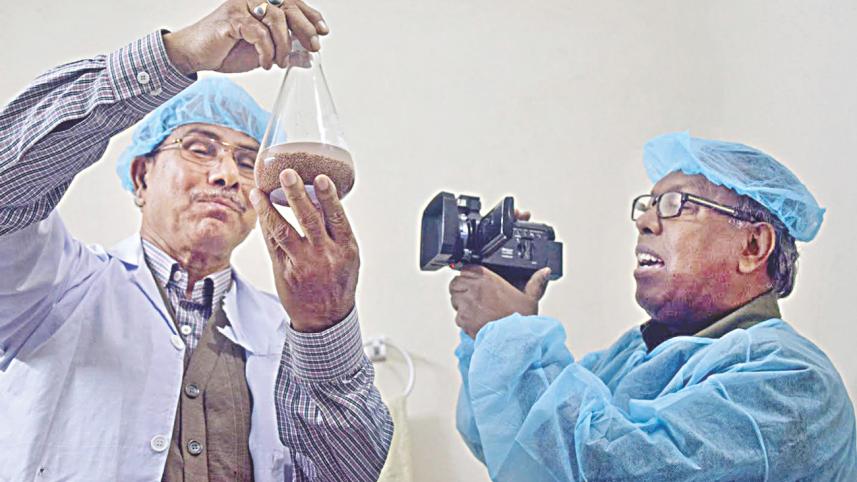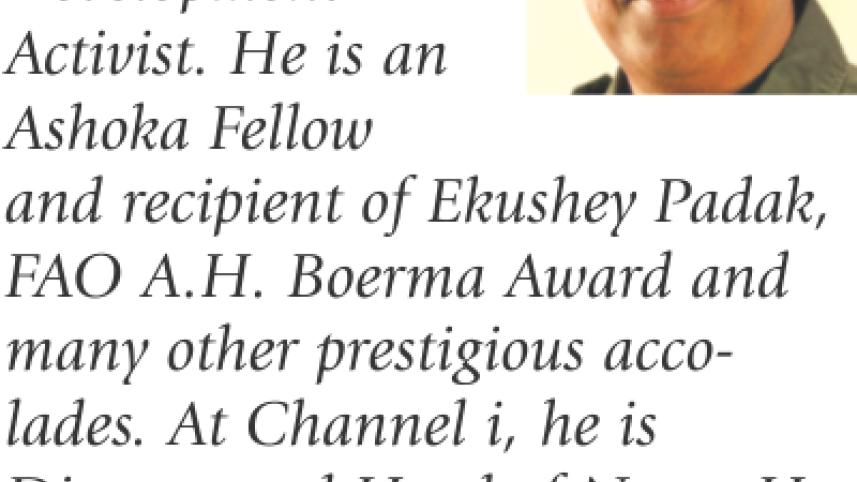A visionary change maker in fish farming
Pituitary gland used to accelerate laying of eggs

During the early 80s - 90s, when I used to host Mati O Manush on Bangladesh Television, I often highlighted that pituitary gland is very important for fish farming. I showed in many episodes that it is collected from inside of the fish head. It is very tiny in size. Later, it is dried and crushed. It is basically a hormone that is injected into female fishes so that they lay eggs quicker.
Later on, artificial pituitary gland took away the place of natural one. It spread out all over the country. It happened in other countries as well. The demand of natural pituitary gland started decreasing. As it is expensive, time consuming etc. It almost became extinct. Then, at some point, pituitary gland started coming from countries like China, India etc. However, that was a long time ago.
I went to Jessore a few days back. You all know that Jessore is a gold field for fish cultivation. I went there to meet Liakat, an entrepreneur who started United Agro Fisheries. He got involved with fish farming in the 80s. All the while, he felt that we badly need natural pituitary gland. Thus, alongside fish cultivation, he got a license and started this company. From then on, he started collecting natural pituitary glands.
I thought of visiting his laboratory as well. However, before that, I wanted to visit a local fish market. I have heard the pituitary gland is collected at the market first. Then it is brought to the laboratory. It gets processed here. Liakat Ali has many agents in the market. They request many buyers to leave the pituitary gland so that the agents could bring them here. At first, I went to the local market, Boro Machhbazar.
Dear readers, here I saw how the agents collect the pituitary glands. Pituitary glands are collected from rui, katol, mrigel, silver carp and grass carp fishes. The retail fish traders of this market collect pituitary gland from the fishes' heads with great interest now. Specially when the buyer buys and has it sorted out, then the traders carefully take the gland out and collect it on a small pot. The buyers find it very interesting as well. However, they don't mind in this case.
Khan Jahan Ali, a fish trader, has already become an expert in this matter.
"How many pituitary glands did you cut out today?"
"250 pieces."
"How much do you get from each piece?"
"2.5-3 taka."
It can be said that sale of this small part serves as a fancy source of income to fish traders. More fishes, more glands.
I have also learned that 18-20 fish traders of this market collect and sell 1.5-2 thousand pituitary glands daily.
Fish traders get motivations from United Agro Fisheries. However, I found this market to be very different. Here, buyers and traders – all have a good understanding in selling and buying pituitary glands. There are agents who have been doing this for more than fifteen years or more.
Dear readers, after witnessing the collection process of the glands, I went back to the laboratory. I saw how it is processed at United Agro Fisheries. If it isn't processed in a specified scientific method, it will never be of any use for artificial insemination of fish. The works are being done gradually with the entrepreneur, Liakat Ali's great attention and care.
Here, acetone is mixed with the gland by providing it in several stages and stirring it in a certain way by hand for a long time.

Amena Khatun is here to clean and sort out raw pituitary glands. I have observed her works. There is no automatic system. However, everything is done in a certain way and utmost focus is necessary for the work.
Liakat Ali follows modern and quality system. He deeply examines if everything is happening correctly at every stage. In the last stage, the pituitary gland is dried by a dryer machine after it has reached the final stage. Then it is weighed. The pituitary gland is marketed in a specific type of bottle with international quality of packaging.
The annual demand of pituitary gland in the country is 40 kg to 50 kg. Liakat Ali says that 4 kg 200 gram of dry pituitary gland were sent to many districts last year. Besides that 1 kg of pituitary gland was exported to many countries including Russia, Iraq, Brazil, Germany and China. Overall, Liakat Ali has opened a sector that has great possibilities.
Liakat, who was a freedom fighter, feels that he's serving his motherland.
"As a freedom fighter, I have a sense of responsibility and I will keep doing it", says Liakat.
Fisheries Extension Officer Mizanur Rahman says if the hatcheries get good quality of pituitary glands then they would play a vital role in the development of fisheries sector.
A big amount of the country's fish fry come from Jessore. To produce eggs, 2-3 kg pituitary gland is needed every year in 60 hatcheries of the district. Already, the big hatcheries of Jessore have started using the pituitary glands collected from Liakat Ali. I found both imported and local glands in one hatchery. The owners say, natural pituitary glands are way better than the artificial ones, as it saves more time. And, the people who are selling it get more profit. They also gave full credit to pituitary glands processed at Liakat's firm and ranked those at the top of their list.
Dear readers, Bangladesh has shown examples of success to the whole world in producing agricultural products and animal meats. Specially, we have much to take pride of in fish production. We are currently ranked fourth in producing freshwater fish. It is not impossible at all to reach the top place. In this case, these activities of producing and marketing pituitary glands will transmit a new power in the whole fisheries sector. In this regard, I hope that successful change makers like Liakat will set true examples behind the progress.




 For all latest news, follow The Daily Star's Google News channel.
For all latest news, follow The Daily Star's Google News channel.
Comments